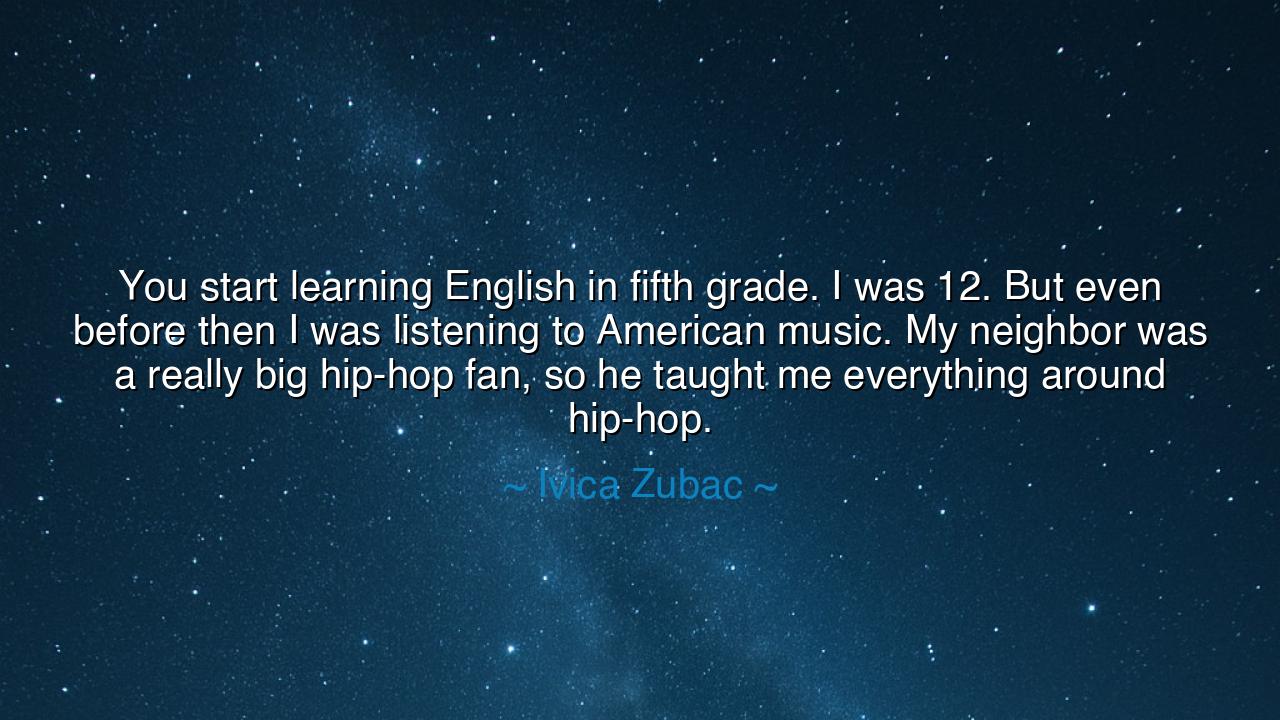
You start learning English in fifth grade. I was 12. But even
You start learning English in fifth grade. I was 12. But even before then I was listening to American music. My neighbor was a really big hip-hop fan, so he taught me everything around hip-hop.






When Ivica Zubac said, “You start learning English in fifth grade. I was 12. But even before then I was listening to American music. My neighbor was a really big hip-hop fan, so he taught me everything around hip-hop,” he was not simply recounting a childhood memory—he was revealing the quiet mystery of how passion becomes a teacher long before the classroom begins. In these words lies a universal truth: that true learning does not wait for permission, nor does it always wear the robe of formal education. It comes through curiosity, through the songs we love, through the people who share their passions with us. Zubac’s story is the tale of how a boy’s world widened not through textbooks, but through rhythm, language, and culture—through the bridge of music that connected distant lands and hearts.
In the ancient way of reflection, Zubac’s experience reminds us that inspiration often begins in the ordinary. A neighbor, a melody, a word overheard—these can become the sparks that light the fire of destiny. Long before Zubac was known as an athlete on a global stage, he was a student of sound, absorbing not only language but energy, identity, and the soul of a culture through hip-hop. What he calls “learning English” was also a deeper education in expression, emotion, and resilience. For the songs he listened to were born of struggle and triumph, of voices rising from the streets to the stars. Thus, through music, he was not merely learning words—he was learning courage, rhythm, and the art of storytelling, lessons that no classroom could teach.
Throughout history, many great minds have learned in such ways—not by instruction, but by immersion. Consider Alexander the Great, who, though tutored by Aristotle, learned his truest lessons not in the halls of philosophy but on the battlefield, listening to the hearts of his soldiers. Or think of Frederick Douglass, who as an enslaved child was forbidden to read, yet learned in secret by listening to the words of others, repeating them until they became his own. Like Zubac, he found teachers where society saw none. These stories, ancient and modern alike, remind us that learning flows toward those who seek it, and that the world itself becomes a school for the open-hearted.
Zubac’s neighbor, the hip-hop fan, becomes in this story a symbol of how knowledge is passed through connection. In every age, wisdom has moved from person to person, not merely through books or institutions, but through friendship, mentorship, and shared passion. The neighbor who shared his music did not know he was shaping the worldview of a young boy—yet he did. Such is the quiet power of influence. The ancients understood this truth when they spoke of the chain of wisdom, where one mind lights another as a torch lights the next. Every word spoken in kindness, every art shared freely, becomes a seed that may grow into greatness.
The quote also speaks of the power of language as liberation. To learn another tongue is to gain another soul, and for Zubac, learning English opened the door to the wider world. But even before grammar and structure, music had already begun to shape his spirit. Through rhythm and rhyme, he absorbed not just vocabulary but culture, empathy, and imagination. Hip-hop, born from the streets as a cry for identity, gave him a window into a world far beyond his own, proving that art is the truest universal language—one that binds people across continents and generations.
In this, Zubac’s journey mirrors that of countless dreamers who have found in art the first whisper of possibility. Just as Beethoven, deafened by fate, still heard symphonies within his soul, so too do those who listen deeply find meaning where others hear only noise. To the attentive, music becomes more than sound—it becomes a guide, a mirror, a teacher. Zubac’s early fascination with hip-hop was not coincidence but calling, for those who listen with the heart often find the rhythm that leads them to their destiny.
And so, my children of the future, let the lesson of Ivica Zubac be this: learning is everywhere, and the world speaks to those who listen. Do not wait for the classroom to begin, nor for the teacher to arrive. Let curiosity be your compass, and passion your path. Listen to the voices around you, for even the humblest neighbor may hold the key to your awakening. Every song, every story, every friendship has the power to shape your mind and expand your soul. Seek wisdom not only in the written word, but in the living rhythm of life itself. For as Zubac’s journey shows, the greatest education begins not with study, but with wonder—and it is through wonder that we learn to speak the universal language of humanity.






AAdministratorAdministrator
Welcome, honored guests. Please leave a comment, we will respond soon